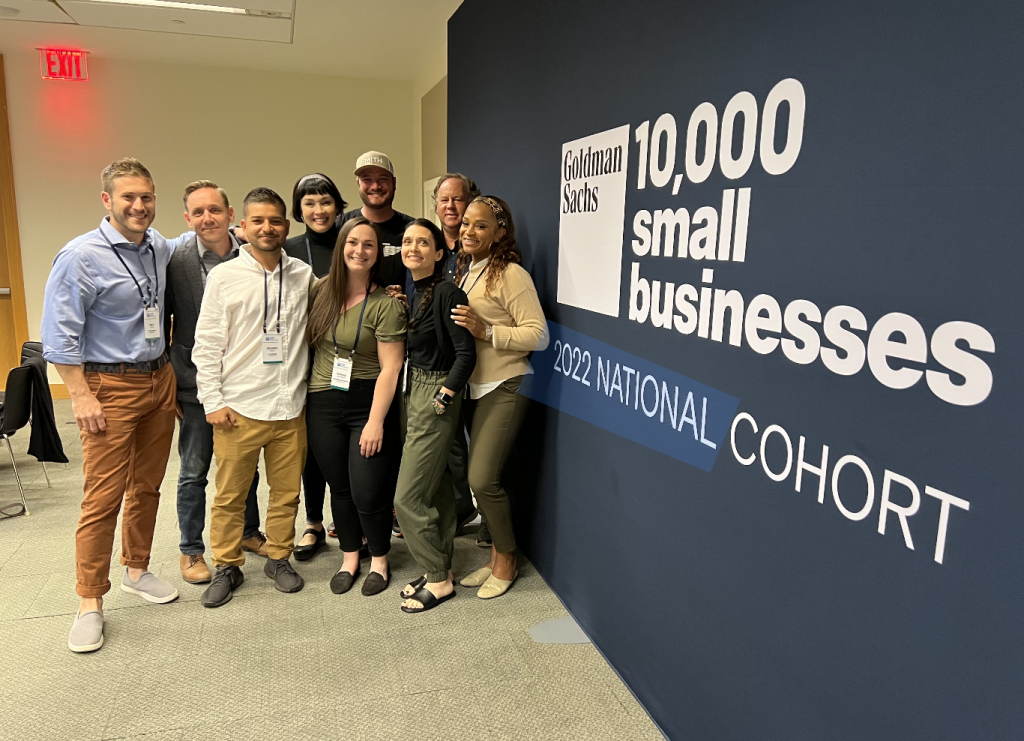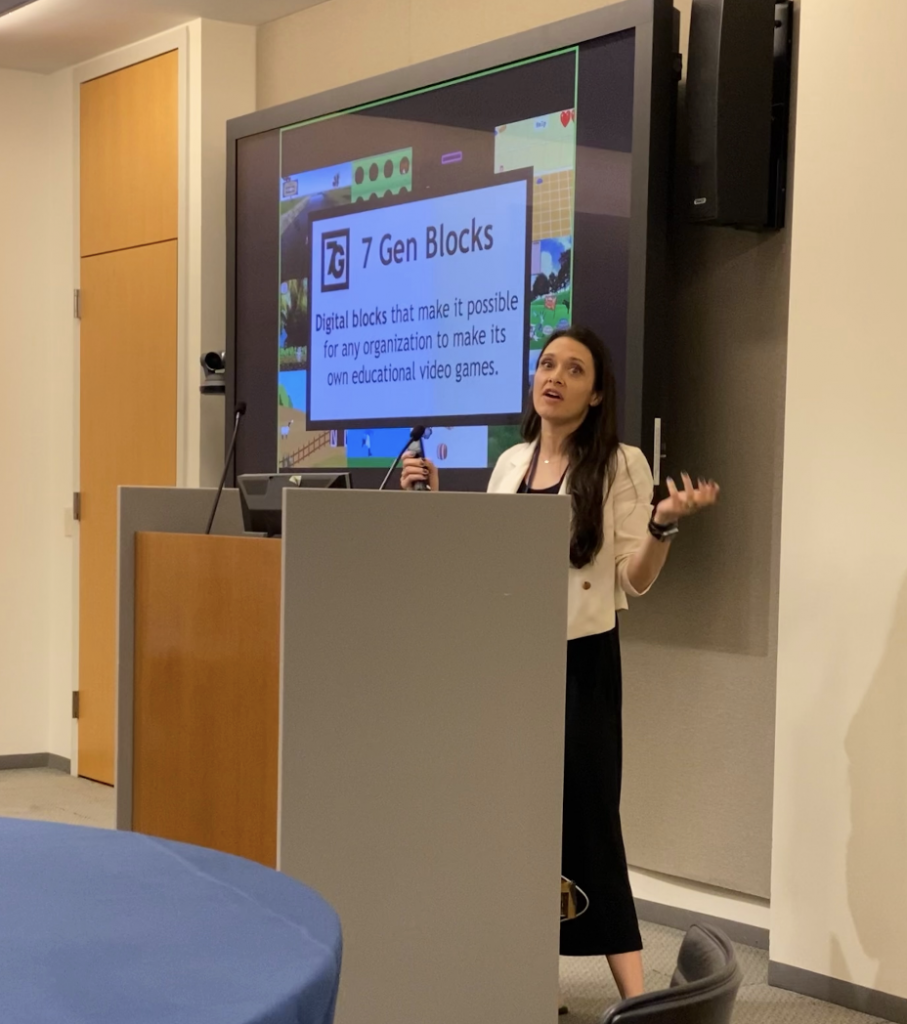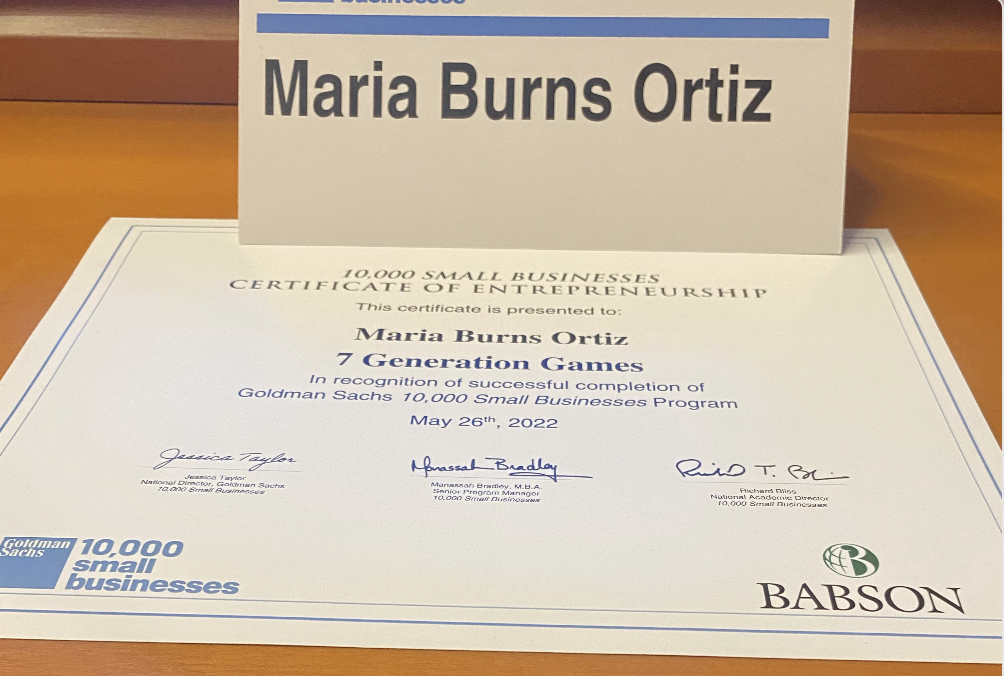I spent all of last week in New York for the final – and in-person! – week of the Goldman Sachs 10,000 Small Business program as part of the national cohort. It was an incredible end to a really worthwhile experience.
If you’re not familiar with 10KSB, it’s a program that focuses on helping small businesses grow by providing educational curriculum, business advising and – my personal favorite part – connecting other small businesses.
1. Expand your bubble.
The thing that I thought was most interesting and valuable about 10KSB is that it’s all kinds of different businesses. In the national cohort, there were four sections, each divided into like 40 companies. (There are local cohorts in some areas, but I’m less sure how that exactly looks as far as numbers.) We didn’t really meet the folks from the other sections until NYC, but got to know the others in Section 1 well enough that I could give you a brief description of what each company does. The section was broken into smaller “growth groups” – typically of 5-7 companies, but ours through circumstances ended up being 10 (which was actually amazing because they were all awesome people).
My group was about as diverse a collection of companies as you could get. Lest you think I am exaggerating, it was: a bike shop in Montana, a gemstone business in Washington, a natural food market in Western Massachusetts, a supper club in Kansas City, a psychedelic therapy clinic in Arizona, a video marketing firm in Denver, a family services treatment provider in Virginia, a chain of cell phone stores in Connecticut, a concrete fabricator in Puerto Rico and an educational video game company in Minneapolis (that one being us). It was the best mix there could be for multiple reasons.
In tech especially, it’s really easy to just be surrounded by “tech” people. You get caught up in conversations about scaling users as fast as possible and chasing investor capital and things that aren’t even about the day-to-day building of a business.
With the way our 10KSB group was structured, there wasn’t any kind of competitive vibe (which can happen when you get a bunch of similar companies together that are in the same “space” as tech people like to say). With folks from across industries, you didn’t need to pretend everything was going perfect for your business because your potential competitor was sitting there. And you were able to get perspectives that you almost certainly wouldn’t have gotten in a group full of tech folks. In our games, we talk a lot about history being a bunch of perspectives that collectively can better tell a story. (That game being AzTech: The Story Begins specifically.) It’s the same thing when you’re looking at how to grow, strengthen and improve your business – different perspectives can shine a light on things you never would have considered.
2. Focus on growth – like all the time.
So I added the “like all the time.” That’s not really Goldman Sachs-speak. And by growth, I don’t mean like user growth (which tech has an obsession with – an unhealthy one, I’d argue) or revenue growth (although I’ll be the first one to admit that you need capital to grow) – but business growth.
In other words, asking yourself: How are you going to grow and build your business to achieve your goals? What is that goal? How will you get there? What metrics will you track? (I’m laughing as I type this because 10KSB repeatedly forces you to drill down on metrics to the point where you’re almost like, “Yeah, yeah, I get. Metrics.” But here I am referencing metrics.) What do you need to achieve that – in terms of staffing, strategy, etc.?
Often when I do our investor reports, I find myself looking back at all we’ve accomplished (most recently surpassing 100K registered users!) and realizing how it’s easy to get so caught up in the day-to-day of running a company and always striving for more – more users, more investors, more revenue, more games developed, more whatever – that you fail to appreciate how far you’ve come.
However, you can also get caught up in striving for “more” that you focus on growth as this all-encompassing, almost unachievable ideal. (And that’s before you throw in the day-to-day challenges of running a company.)
But the focus of the 10-week program is exploring a defined growth opportunity – in our case, our 7 Gen Blocks platform. I believe wholeheartedly that 7 Gen Blocks will be a driving element of our growth going forward. In focusing on that specific growth opportunity (as opposed to EVERYTHING within the company), helped me figure out a better, clearer defined roadmap for growth.
3. There’s tremendous value in understanding – not just knowing – your numbers.
One of the biggest things that attracted me to 10KSB is the focus on understanding your financials. Now, having been 7 Generation Games CEO for seven years, it’s not like I don’t know anything about financials, but in the program, we spent multiple weeks breaking down every element of our financials – looking in minute detail at the things that either your accountant or Quickbooks just automatedly does for you.
Think about it like solving a math problem by hand vs. a calculator. You know the calculator will give you the right answer, but if you’re doing it by hand you know that you fully understand how the formula works. I have always gotten monthly, quarterly and annual reports from our accountant – and was already knowledgeable about our numbers – but there were definitely things that I knew I didn’t know. Now I know them.
After 10KSB, I have a way more in-depth understanding about financial statements. We’ve already started to look at ways that financial data is driving our decision-making, and it also helps us better do all that “exciting” stuff like financial modeling.
4. Leverage the crowd – and don’t be afraid to ask.

The second to last day in New York, our section instructor led a session on networking and advocacy. When talking about networks, he said that everyone had those holes in our networks that we were looking to fill – those intros that we needed or connections that would help us grow our companies – and there were people in the room that could help make that happen, we just needed to ask. And wouldn’t you know that as various people shouted out their needs, from around the room others were able to help in providing those contacts and connections.
It was especially fitting and inspiring because just two days earlier we had launched 7 Generation Games WeFunder to raise a community round, which I am already finding is taking a lot of leveraging our networks and a lot of asking.
If you’re a small business, you should 100% look at applying. (And Goldman Sach isn’t even paying me to say that! Although as an alum of the program, they now do have my address should they want to send me a check… Or invest in our WeFunder. Just saying.) It’s a lot of work – and for the record, when they tell you that it will be 15-20 hours a week and you think, “Yeah, like for everyone else, but it’ll take me less time…” – it will take you 15-20 hours a week. (I took solace in the fact that my fellow cohort members shared they had the same initial thoughts and “Wow, it really is taking 20 hours” realization.) But I met some really great people and learned a lot along the way that will make 7 Generation Games and me better for it.




Pingback: A software entrepreneur wants to empower players to develop their own games | Software – EEN World
Pingback: Un entrepreneur en logiciels veut permettre aux joueurs de développer leurs propres jeux | Logiciel - Les Actualites
Pingback: A software entrepreneur wants to empower players to develop their own games | Technology For You
Pingback: A software program entrepreneur desires to empower gamers to develop their very own video games | Liliana News